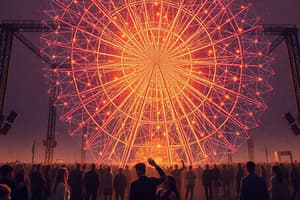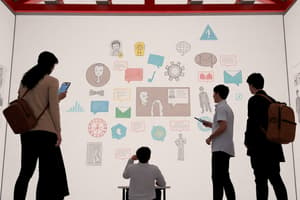Podcast
Questions and Answers
What is the primary function of the family in society?
What is the primary function of the family in society?
- To transmit cultural values and socialize (correct)
- To provide goods and services
- To prepare individuals for roles in society
- To make and enforce laws
What type of society is characterized by a slow pace of change and a strong sense of community?
What type of society is characterized by a slow pace of change and a strong sense of community?
- Post-Modern Society
- Modern Society
- Industrial Society
- Traditional Society (correct)
What is the primary function of the economy in society?
What is the primary function of the economy in society?
- To prepare individuals for roles in society
- To provide moral guidance and spiritual comfort
- To make and enforce laws
- To provide goods and services and distribute resources (correct)
What is the term for unwritten rules that guide behavior and ensure social order?
What is the term for unwritten rules that guide behavior and ensure social order?
What is the term for a system of ranking individuals and groups based on social status, power, and wealth?
What is the term for a system of ranking individuals and groups based on social status, power, and wealth?
What are the consequences of social change?
What are the consequences of social change?
Flashcards are hidden until you start studying
Study Notes
Definition of Society
- A society is a group of individuals who share a common culture, institutions, and a geographic territory.
- It is a complex network of relationships among individuals, groups, and institutions.
Types of Societies
- Traditional Society: Characterized by a strong sense of community, traditional values, and a slow pace of change.
- Modern Society: Characterized by rapid change, individualism, and a focus on progress and innovation.
- Post-Modern Society: Characterized by diversity, fragmentation, and a rejection of grand narratives.
Social Institutions
- Family: The primary institution for socialization and reproduction.
- Education: Prepares individuals for roles in society and transmits cultural values.
- Economy: Provides goods and services, and distributes resources.
- Politics: Makes and enforces laws, and maintains social order.
- Religion: Provides moral guidance, spiritual comfort, and a sense of community.
Social Structure
- Social Hierarchy: A system of ranking individuals and groups based on social status, power, and wealth.
- Social Roles: Expectations associated with a particular position or status in society.
- Social Norms: Unwritten rules that guide behavior and ensure social order.
Social Change
- Causes of Social Change: Demographic, economic, political, and cultural factors.
- Types of Social Change: Reform, revolution, and evolution.
- Consequences of Social Change: Can be positive (e.g., progress, innovation) or negative (e.g., inequality, conflict).
Definition of Society
- A society is a group of individuals who share a common culture, institutions, and geographic territory.
- It is a complex network of relationships among individuals, groups, and institutions.
Types of Societies
- Traditional societies are characterized by a strong sense of community, traditional values, and a slow pace of change.
- Modern societies are characterized by rapid change, individualism, and a focus on progress and innovation.
- Post-modern societies are characterized by diversity, fragmentation, and a rejection of grand narratives.
Social Institutions
- The family is the primary institution for socialization and reproduction.
- Education prepares individuals for roles in society and transmits cultural values.
- The economy provides goods and services, and distributes resources.
- Politics makes and enforces laws, and maintains social order.
- Religion provides moral guidance, spiritual comfort, and a sense of community.
Social Structure
- A social hierarchy is a system of ranking individuals and groups based on social status, power, and wealth.
- Social roles are expectations associated with a particular position or status in society.
- Social norms are unwritten rules that guide behavior and ensure social order.
Social Change
- Demographic, economic, political, and cultural factors are causes of social change.
- There are three types of social change: reform, revolution, and evolution.
- Consequences of social change can be positive (e.g., progress, innovation) or negative (e.g., inequality, conflict).
Studying That Suits You
Use AI to generate personalized quizzes and flashcards to suit your learning preferences.




